International Conference on Vaccines
Feb 20-22, 2017 | Baltimore, USA
Clostridium perfringens, necrotic enteritis and its vaccination in broiler chickens
USDA, USA
Clostridium perfringens type A strains are the main etiological factors for necrotic enteritis (NE), one of the economically important gastrointestinal diseases in poultry responsible for the annual loss of 2 billion dollars in US poultry industry. NE has gained worldwide attention during the last decade. The increasing occurrence of NE is thought to be associated with withdrawal of antibiotic growth promoters from the feed. Many predisposing factors, such as high levels of proteins in the feed, coccidiosis co-infections, immunosuppression, have been found to enhance this disease occurrence. Several infection models will be discussed. C. perfringens culture supernatant infusion alone, in the absence of bacterial cells, was found to affect the pathways related to disease pathogenethesis by inducing expression of genes related to early immunomodulation, inflammation and cell death in the small intestine. Vaccination with modified toxins or other immunogenic antigens seems a logical strategy for such disease prevention. Several vaccine strategies are presented. The most important immunogenic and protective proteins have been tested in several vaccination studies, including alpha toxin and NetB toxin. The combinations of different immunogenic antigens including NetB toxin should be required to protect birds against the severe challenge.
Biography:
Charles Li is a research veterinary medical officer and PI in ARS/USDA. He has DVM and MS in veterinary microbiology, and received his doctorate in animal immunology at the Ohio State University. He performed the novel HIV-vaccine research using attenuated Listeria monocytogenes as vaccine vector and RNA vaccine at University of Pennsylvania. Thereafter his working experience ranges from multidrug resistance bacteria, vaccine development for infectious diseases, cancer therapy and biosafety testing management at several large institutions in US. His current research programs focus on vaccine development for necrotic enteritis, avian immune reagent development and gut micro biome studies in metagenomics and transcriptomics tools.


